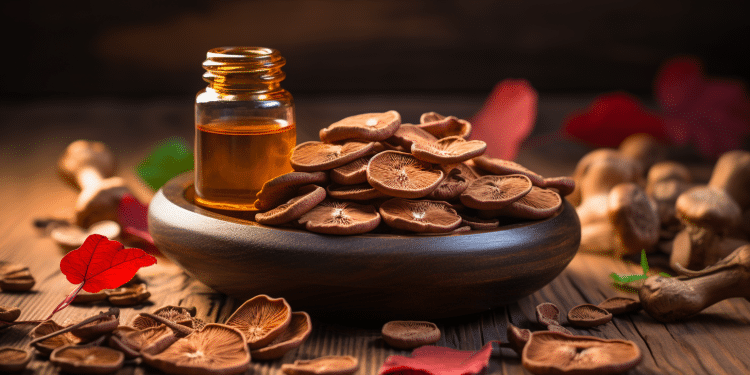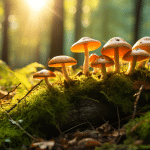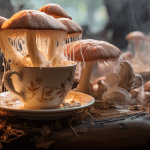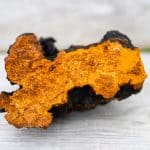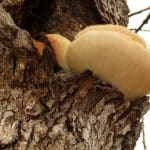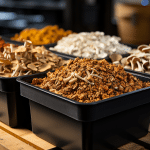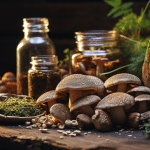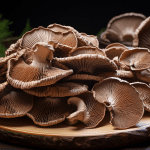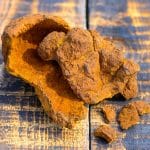A quick google search for “Reishi Mushrooms and Cancer” returns numerous titles on the benefits it has been shown to have on the body, including “fighting cancer”. Ganoderma lucidum, known as the immortal mushroom, contains polysaccharides and a class of compounds called triterpenes. In vitro studies have shown that these compounds, which come from Reishi mushrooms, exert cytotoxic effects on tumor cells.
However, the majority of data are derived from in vitro studies; there are very few studies conducted on humans.
Potential Mechanisms of Action for Reishi Mushroom As A Cancer Treatment
In vitro studies have shown Triterpenes and Polysaccharides from the reishi mushrooms to influence the signaling of cells in tumor cells.
Evidence in Favor of Reishi Mushrooms for Cancer Treatment
A systematic review and meta-analysis included 5 RCTs that evaluated the drug G. lucidum with either placebo or active comparators for patients with cancer. Patients taking G. lucidum had an improvement in responses to chemotherapy or radiotherapy (relative risk, 1.50; 95% CI, 0.90-2.51; P=.02), but no benefit was observed with the administration of G. lucidum alone. G. lucidum ingestion increased percentages of CD3, CD4, and CD8-positive cells, as well as increased number of leukocytes, Nk-cell activity, and CD4/CD8 ratio. The review found minimal adverse effects, including nausea and insomnia, and no hematologic or liver toxicities.
In one small, randomized controlled study, five out of 40 patients with gynecologic cancer experienced stabilization of their disease after rescue therapy with water extracts from the genus G. lucidum and its spores.
The number of patients diagnosed with cancer has been increasing every year. Certain malignancies have been the leading cause of death for some populations. People diagnosed with cancer want to do whatever it takes to fight off the disease, cope with the symptoms, and deal with the side effects of radiation/chemotherapy.
Many are turning to complementary and alternative medicines. G. lucidum extract is one of the medicines widely used in traditional Chinese medicine (TCM) practitioners in this respect. It is commonly recommended as a supplement to strengthen the immune system during the course of cancer therapy.
Recent laboratory studies and preclinical trials on G. lucidum show promise for its anti-tumor activities. However, clinical evidence for its effectiveness is scarce, and systematic reviews are needed to bring together the collective knowledge of healthcare consumers.
Our review identified, and later included, five eligible RCTs. A total of 373 subjects were analyzed. Meta-analyses were performed to combine the data available in the separate trials.
Our results showed that patients who had reishi extracts as part of their cancer treatment were 1.27 times more likely to have responded to chemotherapy or radiation therapy compared with those who did not. However, data failed to show a significant effect on tumor shrinkage when used by itself. Furthermore, reishi can stimulate the immune function of host, significantly increasing the proportion of CD3, CD4 and CD8 lymphocytes.
However, the activity of natural killer (NK) cells, which has been suggested as a marker for self-defense against tumor cells, was only slightly increased. Patients from the G. lucidum group were found to experience relatively better quality of life following treatment compared with patients from the control group. A small number of cases were reported with mild side effects associated with treatment with G. lucidum, including nausea and insomnia.
Evidence Against
An open-label trial compared Agaricus blazei (Murilli mushrooms) extracts to that of reishi in 47 men experiencing biochemical failure following aggressive treatment for prostate cancer. There was no effect of any mushroom extract on the primary outcome measure, Partial Response Rate (defined as a reduction of prostate-specific antigen by at least 50%). Another open-label trial of men with late-stage lung cancer evaluated the effects of G. lucidum hydrossoluble polysaccharides on immunological function. There was a large amount of variability across 36 patients, but there were generally no major differences in the average mitogenic response to phytohemagglutinin, nor were there any major differences in the levels of CD3, CD4, CD8, CD56, interleukin (IL), IL-6, interferon-gamma, or NK activity.
There are limitations of the results from this systematic review. First, the majority of included studies were small, and methodological quality of the individual trials was of concern. Second, all participants of the individual trials were recruited from Chinese populations. Together, robustness and the generalisability of results were significantly affected.
Conclusion: Is Reishi Mushroom a Good Cancer Treatment?
There are multiple, consistent in vitro reports of anticancer activity through several molecular mechanisms that suggest reishi mushrooms may have anticancer activity. Although reishi mushroom should never be used alone as a sole cancer treatment, and you should always follow the instructions and treatment recommendations of your doctor and medical professionals. Due to the evidence showing the potential for reishi mushrooms to improve response to chemotherapy, you could ask your doctor if reishi is something you can include in your overall treatment plan.
A small number of clinical trials using reishi mushrooms or their extracts are available, and, of those trials that have been conducted, data does not support their use. To date, the only positive trial showed an improvement in response to chemotherapy. This is hypothesis-generating; further studies are needed to establish whether reishi mushrooms have anti-cancer effects, including a synergistic or sensitizing effect with other agents. Our review did not find enough evidence to warrant using G. lucidum as a first-line therapy for cancer.
It remains unclear if G. lucidum helps to extend cancers survival over a prolonged period. However, G. lucidum may be administered as an alternative supplement to conventional therapies, given its potential for intensifying tumor responses and stimulating host immunity.
G. lucidum was generally well tolerated by the majority of participants, with only a few small adverse events. No significant toxicities were observed throughout the trial.
Although few reports have been reported on the detrimental effects of G. lucidum, use of its extracts should be done with caution, particularly after careful consideration of the costs-benefits and patients preferences. Future studies should focus on improving the quality of methods, and additional clinical studies of G. lucidums effects on cancer long-term survival are needed. An update to this review will be conducted every two years.
You can find our favorite capsules, powders, and tincture’s on the following pages of our website and learn more about each individually:
The Best Reishi Mushroom Supplement
The Best Reishi Mushroom Powder
The Best Reishi Mushroom Tincture
The Best Reishi Mushroom Mushroom Gummies
Additional Resources:
Reishi mushrooms for allergies
Reishi mushroom for breast cancer
Updated 10/21/2022
